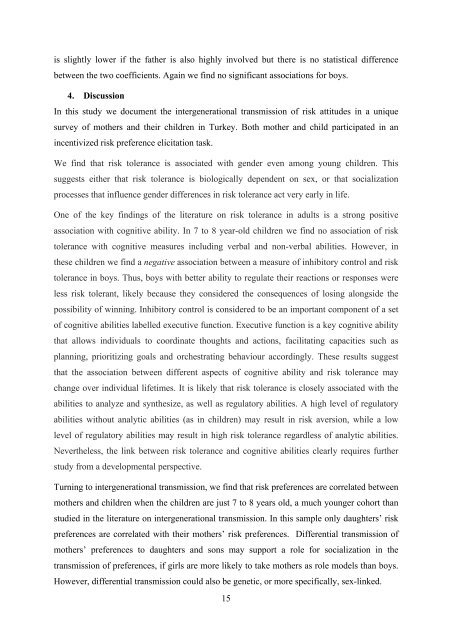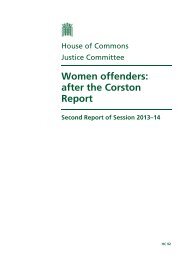Parental socialisation effort and the intergenerational transmission ...
Parental socialisation effort and the intergenerational transmission ...
Parental socialisation effort and the intergenerational transmission ...
- No tags were found...
Create successful ePaper yourself
Turn your PDF publications into a flip-book with our unique Google optimized e-Paper software.
is slightly lower if <strong>the</strong> fa<strong>the</strong>r is also highly involved but <strong>the</strong>re is no statistical differencebetween <strong>the</strong> two coefficients. Again we find no significant associations for boys.4. DiscussionIn this study we document <strong>the</strong> <strong>intergenerational</strong> <strong>transmission</strong> of risk attitudes in a uniquesurvey of mo<strong>the</strong>rs <strong>and</strong> <strong>the</strong>ir children in Turkey. Both mo<strong>the</strong>r <strong>and</strong> child participated in anincentivized risk preference elicitation task.We find that risk tolerance is associated with gender even among young children. Thissuggests ei<strong>the</strong>r that risk tolerance is biologically dependent on sex, or that socializationprocesses that influence gender differences in risk tolerance act very early in life.One of <strong>the</strong> key findings of <strong>the</strong> literature on risk tolerance in adults is a strong positiveassociation with cognitive ability. In 7 to 8 year-old children we find no association of risktolerance with cognitive measures including verbal <strong>and</strong> non-verbal abilities. However, in<strong>the</strong>se children we find a negative association between a measure of inhibitory control <strong>and</strong> risktolerance in boys. Thus, boys with better ability to regulate <strong>the</strong>ir reactions or responses wereless risk tolerant, likely because <strong>the</strong>y considered <strong>the</strong> consequences of losing alongside <strong>the</strong>possibility of winning. Inhibitory control is considered to be an important component of a setof cognitive abilities labelled executive function. Executive function is a key cognitive abilitythat allows individuals to coordinate thoughts <strong>and</strong> actions, facilitating capacities such asplanning, prioritizing goals <strong>and</strong> orchestrating behaviour accordingly. These results suggestthat <strong>the</strong> association between different aspects of cognitive ability <strong>and</strong> risk tolerance maychange over individual lifetimes. It is likely that risk tolerance is closely associated with <strong>the</strong>abilities to analyze <strong>and</strong> syn<strong>the</strong>size, as well as regulatory abilities. A high level of regulatoryabilities without analytic abilities (as in children) may result in risk aversion, while a lowlevel of regulatory abilities may result in high risk tolerance regardless of analytic abilities.Never<strong>the</strong>less, <strong>the</strong> link between risk tolerance <strong>and</strong> cognitive abilities clearly requires fur<strong>the</strong>rstudy from a developmental perspective.Turning to <strong>intergenerational</strong> <strong>transmission</strong>, we find that risk preferences are correlated betweenmo<strong>the</strong>rs <strong>and</strong> children when <strong>the</strong> children are just 7 to 8 years old, a much younger cohort thanstudied in <strong>the</strong> literature on <strong>intergenerational</strong> <strong>transmission</strong>. In this sample only daughters’ riskpreferences are correlated with <strong>the</strong>ir mo<strong>the</strong>rs’ risk preferences. Differential <strong>transmission</strong> ofmo<strong>the</strong>rs’ preferences to daughters <strong>and</strong> sons may support a role for socialization in <strong>the</strong><strong>transmission</strong> of preferences, if girls are more likely to take mo<strong>the</strong>rs as role models than boys.However, differential <strong>transmission</strong> could also be genetic, or more specifically, sex-linked.15
















